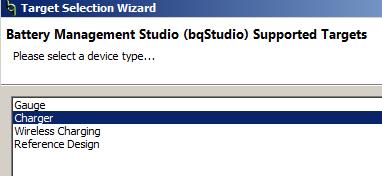SLUUCT7C May 2023 – June 2024 BQ25756
2.4.1 Equipment Set Up

Use the following guidelines to set up and test the equipment:
- Set power supply #1 for 23V DC, 8A current limit and then turn off the supply.
- Connect the output of power supply #1 in series with a current meter to J1 (VIN and PGND).
- Connect a voltage meter across J1 (VIN) and J1 (PGND).
- Connect load #1 in series with a current meter to J3 (VBAT and PGND).
- Connect a voltage meter across J3 (VBAT and PGND).
- Set 23V at KEPCO load output. Limit KEPCO to 6A. Use load #1 to power EVM from the VOUT output.
- Connect J5 to the EV2400. Connect J5 to the I2C PORT 2 on the EV2400.
- Make sure the jumpers are installed as indicated in IO and Jumper Descriptions.
- Turn on the computer and load #1. Open the
bqStudio software.
- Select Charger and click the
Next button.

- Select Charger_1_00_BQ25756.bqz on the Select a Target Page.
- After selecting the target device, click Field View and then click the Read Register button.
- Select Charger and click the
Next button.
- Set WATCHDOG and EN_CHG to disabled.
- In 16 Bit Registers, set ICHG_REG to 4000mA.
- Turn on power supply #1, measure:
V(J1(VAC)) = 23V ± 0.5V
I(J1(IAC)) = 4.1A ± 0.5A
V(J3(VBAT)) = 23V ± 0.5VI(J3(IBAT)) = 3.9A ± 0.5A
- Set power supply #1 for 40V, measure:
V(J1(VAC)) = 40V ± 0.5V
I(J1(IAC)) = 2.4A ± 0.5A
V(J3(VBAT)) = 23V ± 0.5VI(J3(IBAT)) = 3.9A ± 0.5A
- Set power supply #1 for 19V, measure:
V(J1(VAC)) = 19V ± 0.5V
I(J1(IAC)) = 5.0A ± 0.5A
V(J3(VBAT)) = 23V ± 0.5VI(J3(IBAT)) = 3.9A ± 0.5A

